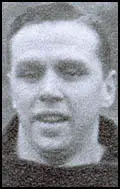Laurie Scott

Laurie Scott was born in Sheffield on 23rd April 1917. A talented footballer he joined Bradford City in 1934. He played in 39 league games before joining Arsenal in February 1937.
A full-back, Scott played in the reserves for two years before the outbreak of the Second World War. Most of Arsenal playing staff joined the Royal Air Force. This included Ted Drake, Jack Crayston, Eddie Hapgood, Leslie Jones, Bernard Joy, Alf Kirchen and George Swindin. Some of them, including Scott, got jobs as Physical Training instructors and did not see action.
Scott won sixteen war time international caps between 1941-45. He made his league debut for Arsenal on the opening day of the 1946-47 season against Wolves. That season he played in 28 games for the club.
Scott won his first international cap for England against Northern Ireland on 28th September 1946. England won 7-2 and Scott kept his place in the team for the rest of the season and played against the Republic of Ireland (1-0), Wales (3-0), Holland (8-2), Scotland (1-1), France (3-0), Switzerland (0-1) and Portugal (10-0). Other members of the team that year included Frank Swift, Tom Finney, Raich Carter, Tommy Lawton, Stan Mortensen, Wilf Mannion and Stanley Matthews.
Scott played in 39 games in Arsenal's championship winning team in the 1947-48 season. The following season he was a member of the Arsenal team that beat Liverpool to win the 1950 FA Cup Final. However he suffered a serious knee injury in a game against Wales. It was the last of his 17th international caps for his country.
In the 1950-51 season a recurrence of the knee injury meant that he could only play in 17 league matches. After playing a total of 126 league and cup matches for Arsenal Scott became player/manager of Crystal Palace in October 1951. He also had spells as manager of Hendon and Hitchen Town.
Laurie Scott died on 7th July 1999.
Primary Sources
(1) Stan Mortensen, Football is My Game (1949)
That is Laurie Scott of Arsenal, who has been repeatedly selected for England and yet received on occasion less than his due. Many players can be judged from the stands, and many incidents of matches can best be seen from there. But there are some men whose play is only valued to the full by those around them, and one such is Laurie. He has speed above the ordinary for a full-back, tries to keep the ball in play, and has, like so many other Arsenal players, perfected the art of dropping back to the goal-line to help clear if the goalkeeper is beaten.
